Global Emergency Update April 2024 —This is the latest report on Catholic Relief Services’ ongoing emergency response and recovery activities around the world. Our work is possible thanks to the generous support of private and public donors, the dedication of local partners, and the unwavering presence of Caritas and the local Catholic Church.


Global Emergency Update January 2022
What Your Support Makes Possible
Afghanistan
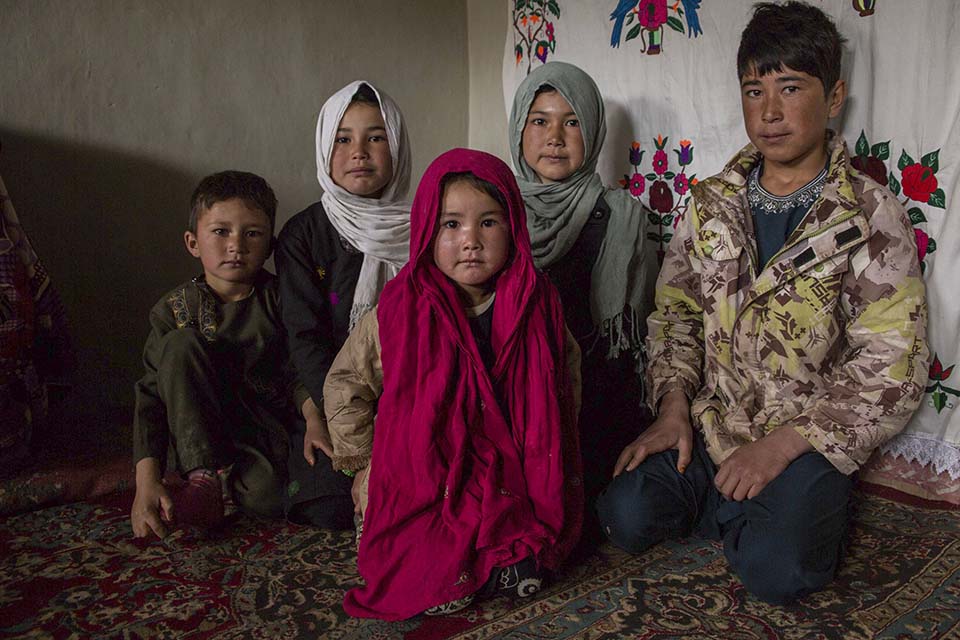
Afghanistan is experiencing its worst drought in living memory. CRS is responding with emergency cash assistance to thousands of small-scale farming families.
Photo by Stefanie Glinski for CRS
Rural farming families are experiencing unprecedented levels of hunger and malnutrition. As many as 23 million people are facing starvation. This food crisis is primarily due to the worst drought in living memory, and exacerbated by a financial crisis following the Taliban takeover, as well as by waves of COVID‑19. This coincides with the winter lean season when food supplies from harvests are exhausted and families face shortages even in the best years. But the current winter threatens extraordinary hardship and widespread loss of life, particularly among young children. Farmers may not be able to afford seed and materials to plant staple foods for the coming year.
CRS is responding across the west and central highlands and is the only international humanitarian organization on the ground in most of the rural districts where we work. High rates of acute malnutrition are reported across 16 provinces, where people are adopting extreme coping strategies in order to feed their families—such as selling livestock and other assets, and leaving their villages to seek work as day laborers in urban areas. CRS is providing emergency cash assistance to enable thousands of small‑scale farming families to plant their crops and buy basic food items. We are complementing the assistance with trainings in simple, low‑cost livestock management practices that have been proven to yield good results in the Afghanistan highlands.
CRS is continuing primary education support for 17,500 children, and we hope to reach 22,000 children in the year ahead. CRS has offices across the country and hundreds of experienced Afghan staff. Our operations have continued peacefully since the recent transition in government and we remain committed to the people of Afghanistan.
Northern Ethiopia
A humanitarian crisis continues to be highly unpredictable in northern Ethiopia. Since early November 2020, armed conflict between federal and regional forces in the Tigray region has continued against a broader backdrop of political transition, severe drought, desert locust invasions and the continued burden of the COVID‑19 pandemic. Over the past year, the conflict has spilled over into the neighboring Amhara and Afar regions. More than 8 million people are affected by the conflict in Amhara, Afar and Tigray, including 2.1 million who are displaced. In Tigray alone, 5.2 million people are in urgent need of food and other lifesaving assistance. Thousands of people have been separated from their families, and a lack of fuel and restrictions on movement are impeding both business continuity and humanitarian assistance.
CRS is working with Caritas Ethiopia and our diocesan partners, and coordinating with the United Nations and humanitarian responders to provide urgent relief. Since the start of the conflict, CRS has been able to provide food to 3 million people, but these distributions have been disrupted due to security issues and lack of access. We hope to reach up to 6.5 million people with food relief as access allows. CRS has also supported malnutrition screenings and provided living supplies, cash assistance for food and supplies, shelter construction for the displaced, clean water and hygiene kits, and construction of water infrastructure. We hope to gain safe access to resume the provision of lifesaving food, water, health and nutrition, shelter and psychosocial support to millions of people in urgent need.
East Africa
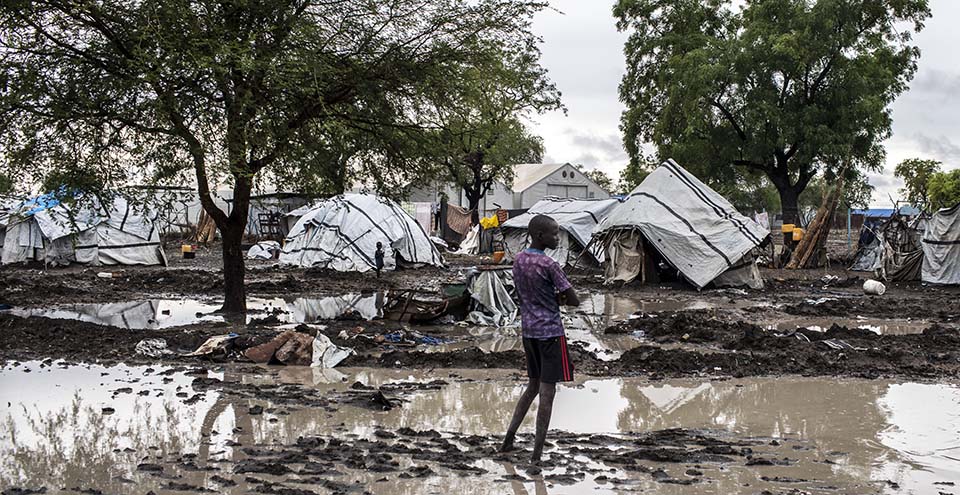
Flooding in South Sudan has contributed to the country experiencing one of the worst hunger crises on record globally.
Photo by CRS staff
Across Kenya, Somalia and South Sudan, drought, flooding and diminishing crops have compounded a crisis facing millions of vulnerable people across the region. South Sudan is experiencing one of the worst hunger crises on record globally, as almost 70% of its population needs urgent humanitarian assistance. Malnutrition is a major public health emergency, with an estimated 1.8 million children and pregnant and new mothers acutely malnourished this year. In Kenya, the drought—combined with pasture and crop destruction by locust swarms, as well as ethnic conflict—has led to migration and a devastating depletion in pasture and water for livestock. The nutritional status of children is deteriorating: A reported 541,662 children under the age of 5 are suffering from acute malnutrition. Of these, 140,993 children have required lifesaving treatment. In Somalia, drought, locust invasions and the economic impacts of COVID‑19 are affecting herding and farming communities, leading to displacement and conflict around land tenure and resources. Malnutrition rates among children are soaring as food, water and income sources diminish.
CRS is providing urgent assistance tailored to the needs and context of the affected countries. Emergency efforts in South Sudan include mobile medical units that provide health and nutrition services in previously uninhabited areas where displaced communities have migrated, as well as water, sanitation and hygiene, including the drilling of boreholes and construction of latrines in communal areas. In Somalia, there has been water trucking and hygiene promotion, while in Kenya, CRS has supported rehabilitation of government water infrastructure through the provision of equipment, pumps, fuel and community maintenance. CRS has also provided cash assistance and vouchers to enable families to buy critical food and living supplies, and boost income to cover basic needs; nutrient‑rich agricultural seeds, training and support for farming and crop production; feed and support for livestock health—including vaccinations, deworming, pasture, training on rangeland and pasture production—as well as cash‑for‑work activities. CRS will prioritize the needs of the most vulnerable and underserved communities.
Southern Madagascar
Three years of severe drought have wiped out harvests and hampered people’s access to food in the Grand South region. Of the 10 hardest‑hit districts, Amboasary Atsimo is at the epicenter, with nearly 14,000 people at catastrophic hunger levels and lacking basic services, even as they attempt various coping strategies. The situation and the delay in international support has caused migration out of the south, and is creating rapid environmental degradation of original dry forests, known for their unique biodiversity. With the failure of two consecutive harvests, food prices are rising. More than 500,000 children under age 5 in Grand South will likely suffer acute malnutrition through April 2022. Of these, over 110,000 are severely malnourished.
CRS is responding with emergency assistance to meet the diverse needs, and has supported 230,000 people. This includes the provision of seeds to farmers in the south, which is crucial to breaking the cycle of food insecurity. We will work with farmers to prevent further harvest losses and increase crops and production. We have distributed 16.2 tons of food to communities experiencing severe food shortages and hunger, cash assistance for people to buy critical supplies, and Plumpy’Sup nutritional supplement for children experiencing moderate acute malnutrition. We have also rehabilitated 14 water points and constructed two sand dams to increase access to clean water.
Bangladesh Rohingya Response
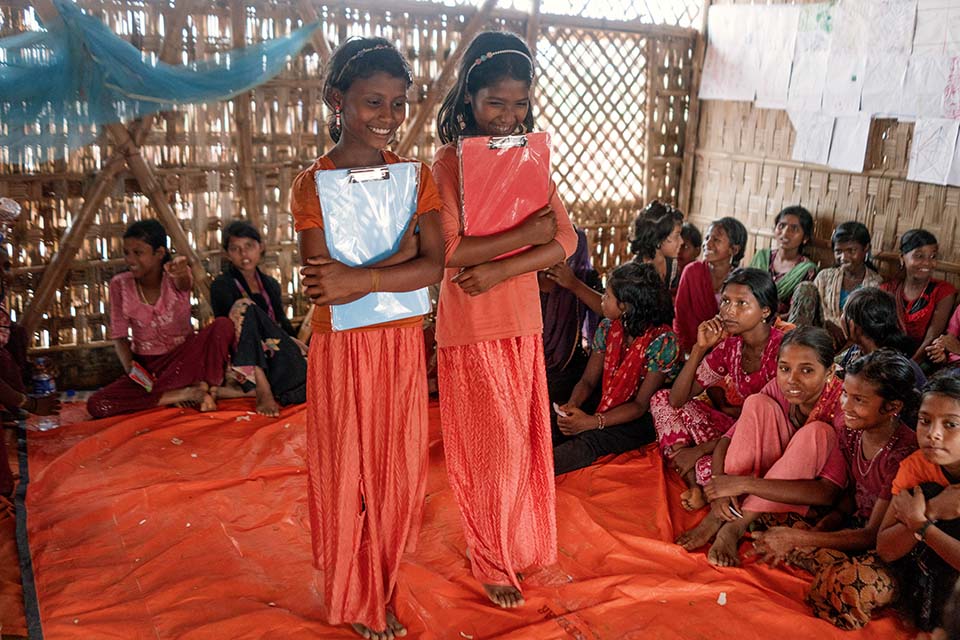
Children take part in a theater performance at a CRS child-friendly space at Kutupalong-Balukhali Expansion Site in Cox’s Bazar, Bangladesh.
Photo by Ismail Ferdous for CRS
Over the past few years, Bangladesh has become home to the world’s largest refugee settlement. In August 2017, more than 700,000 Rohingya refugees fled Myanmar for neighboring Bangladesh, expanding the refugee population here to nearly 1 million. They fled after decades of discrimination and repression under successive governments in Myanmar’s Rakhine State. More than 600,000 Rohingya live at the Kutupalong‑Balukhali Expansion Site.
Since the onset of the crisis, CRS and Caritas have worked closely with the government of Bangladesh, local communities and other partners to provide food, shelter, water and sanitation services, health care, psychosocial support and protection services to more than 265,000 Rohingya refugees. Our support has evolved with the changing context and needs of families—from urgent food, water and shelter to long‑term support. Our focus now is ensuring that families are protected from harm, able to live with dignity, can heal from grief, stress and trauma, and are ready to return to Myanmar should conditions become suitable. Priorities for support engage Rohingya refugees and local host communities. Critical support includes the building of safe homes and communities; protection, counseling and social services for the most vulnerable; children’s informal education, recreation and youth programming; and livelihoods activities.
Syrian Refugee Education
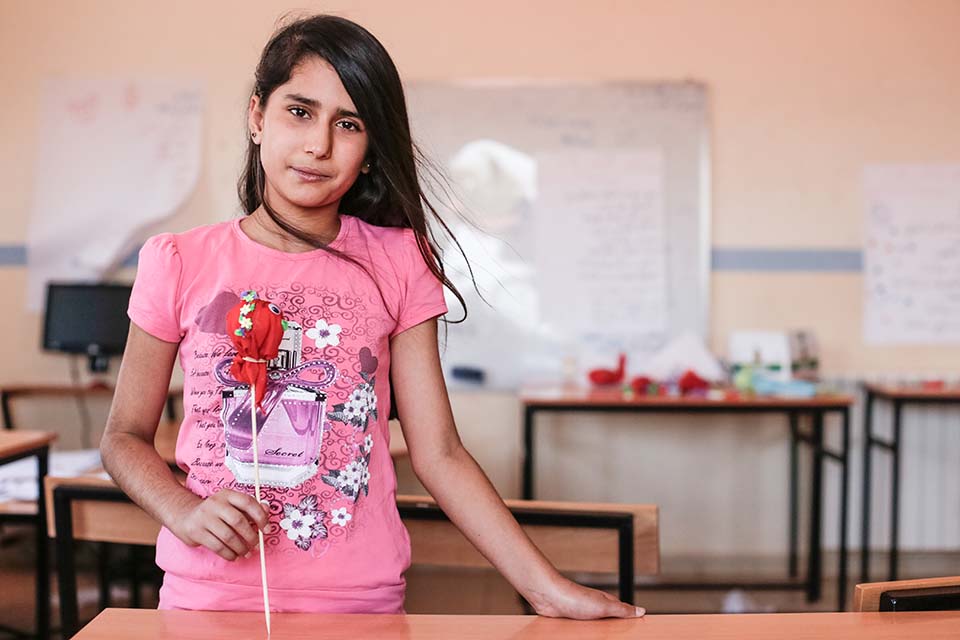
A child holds a puppet she made during a psychosocial play exercise at a summer school run by CRS partner the Good Shepherd Sisters in Lebanon.
Photo by Sam Tarling for CRS
The war in Syria has now entered its 11th year. Since the crisis began, life expectancy among Syrians has fallen by more than 20 years. The conflict has uprooted more than half the population from their homes and forced 5.6 million Syrians to flee to neighboring countries. While some areas are stable and recovering, living conditions and opportunities remain a challenge. Lebanon still hosts 1.5 million Syrian refugees, while Jordan hosts 670,000.
For children, the challenges of living through war have the potential to change the trajectory of their lives and shape the adults they become. Many refugee children have been out of school for years, making it hard for them to reintegrate into the classroom. Many have lost a close relative or are separated from family, friends and community. This long‑term crisis has had significant psychological impacts on all members of households.
Education plays a vital role in providing structure, healing and a sense of normalcy for children. CRS and our partners in Lebanon and Jordan provide comprehensive support for communities and families, including education counseling and care for children.
Priorities include improvements to public and private classrooms, kindergarten classes, tutoring to prevent dropping out, safe transportation, healthy snacks, parent-teacher meetings, training for teachers and staff, and support for parents and caretakers.
Yemen
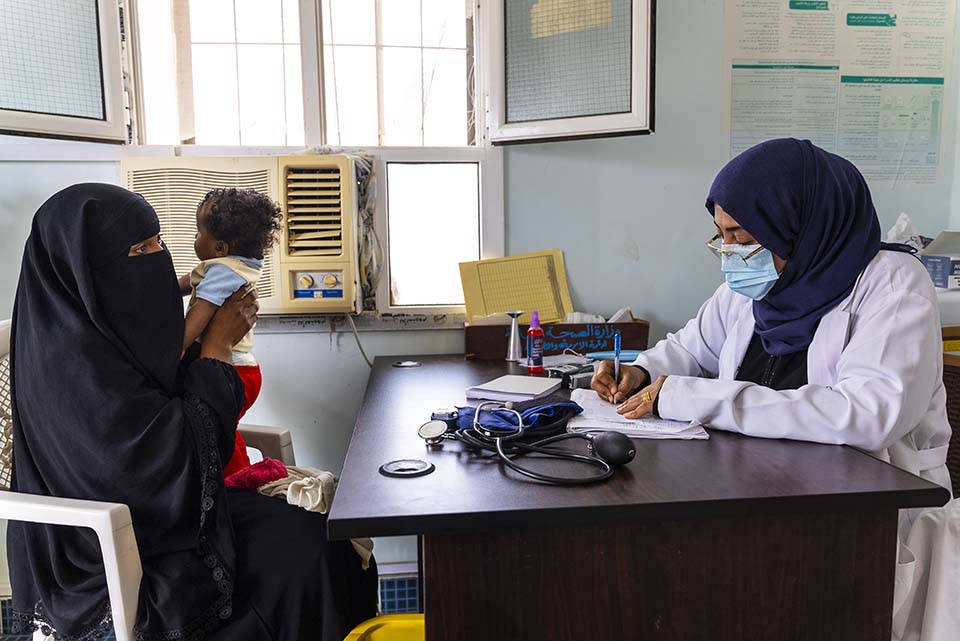
In Yemen, CRS and our partners have been working to strengthen health systems to respond to COVID-19.
Photo courtesy of Caritas Poland
A humanitarian crisis has devastated the lives of families across the country as a five‑year war continues between Houthi rebels and forces loyal to the government, backed by a Saudi Arabia‑led coalition. With a blockade and insecurity severely limiting people’s access to food and income, 80% of the population is in urgent need of aid, including 2 million children suffering from acute malnutrition.
Health systems have collapsed, along with access to clean water and sanitation, which has led to deadly cholera outbreaks and other diseases. An estimated 3.3 million people have been displaced, and more than twice that number have lost their livelihoods.
CRS has been working closely with local partners Education for Employment and Caritas Poland to provide vital water and sanitation support to prevent the spread of disease. The needs have been compounded by the COVID‑19 pandemic. We have expanded our emergency programming to address the diverse needs of people who face extreme hunger and hardship. Efforts include providing training for young Yemenis to fulfill the needs of understaffed heath facilities and hospitals, equipping vulnerable communities with information to prevent the spread of COVID‑19, and strengthening health systems to respond to the pandemic. Programs will take place in Sana’a and Aden governorates, and aim to reach 200,000 people.
Venezuela
Since 2015, Venezuela has been in a social and economic crisis. A drastic fall in the price of oil, its main export, led to a progressive decline in local production capacity, resulting in food shortages, hyperinflation, the collapse of the health system and social unrest. As much as 87% of Venezuela’s population has been pushed below the poverty line and thousands of children are experiencing malnutrition. More than 5.6 million Venezuelans have left the country in recent years to provide for their families, with neighboring countries such as Trinidad and Tobago, Curacao, Aruba, Colombia, Brazil, Ecuador and Peru facing increasing flows of Venezuelan refugees. COVID‑19 has led to further marginalization of refugees in host countries. Thousands have had to return to Venezuela after having lost access to shelter and livelihood opportunities in neighboring countries due to COVID‑19 restrictions and stigmatization.
In Venezuela and across the region, our Caritas partners—with CRS accompaniment and technical support—provide assistance based on the local context and needs, including supplies and equipment for hospitals; food and medicine for malnourished children and pregnant or new mothers; distribution of hygiene kits, mosquito nets and water, sanitation and hygiene supplies to families; food and support for the homeless; safe shelter for refugees and those in transit; cash assistance; legal guidance; and capacity support for partner organizations providing lifesaving services.
Central America Migrant Crisis
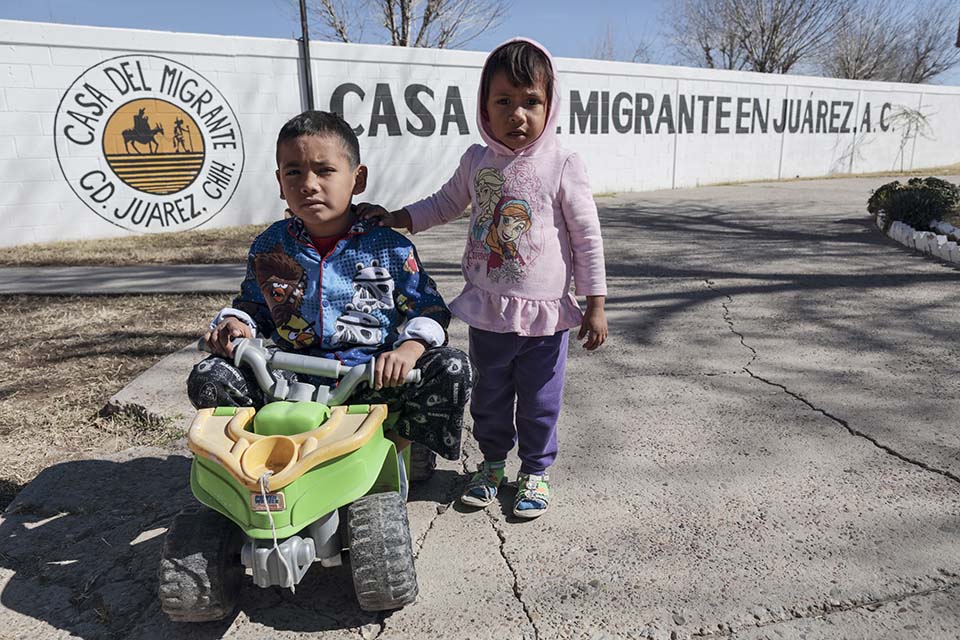
Children at a migrant shelter in Ciudad Juarez, Mexico, run by the Catholic Church.
Photo by Oscar Leiva/ Silverlight for CRS
The rising number of migrants seeking safety and livelihoods outside of their own country has led to escalating humanitarian needs, as well as risks for deportees. Increased deportations to Haiti and the Mexico-Guatemala border have exacerbated the crisis. In many cases, people are being deported to places where there are no government or civil society organizations to provide support. Local faith‑based shelters continue to be the first responders to this crisis. With limited financial esources—and with support from volunteers, parishes and local communities—these shelters offer migrants a place to sleep, bathe, eat, and receive medical care and other services.
Small pastoral‑run shelters have had to scale up services, food, medicine and the provision of basic information to four times their normal capacity. CRS continues to support migrant shelters along the Mexico-Guatemala corridor, and is ramping up support for these partners, providing urgent, quality social services. And, CRS and our partners respond swiftly to meet the needs of those returning with limited belongings to their communities of origin.
Priority needs for migrants, and the shelters that support them, include food, psychosocial care and support; legal advice; information about COVID‑19 prevention; hygiene supplies; and COVID‑19 testing. Since January 2021, CRS has supported 31 shelters to serve 127,928 migrants.
HOMES AND COMMUNITIES
A SAFE HOME IS THE STARTING POINT FOR RECOVERY
Since launching its strategic 10‑year platform in 2020 to Build Safe Homes and Communities, CRS has piloted and expanded emergency programming for people displaced by crisis, including natural disasters, conflict and climate change. We recognize that a safe home is the starting point for recovery. The loss of a home can mean separation from loved ones and support networks, and limited access to food, water, health and social services, education and livelihood options. More than 80 million people worldwide have been displaced due to conflict.
CRS is building on decades of experience to expand an approach to emergency shelter that goes beyond the physical structure to build the foundation for holistic recovery. This is grounded in our commitment to integral human development. For example, as we help build safe homes and living environments for families and communities displaced by crisis, we integrate efforts to help them prepare for crises before they strike; address issues of safety and social cohesion; ensure access to clean water; strengthen the emergency response capacity of local institutions; and promote durable solutions relevant to the local context.
Our strategy aims to expand to our direct assistance for 1.5 million people in immediate need.
More broadly, it also aims to extend our impact to assist a further 8.5 million people through systems‑level change. This will be achieved by influencing key stakeholders to adopt safe and dignified approaches to rebuilding homes and communities in the aftermath of emergencies. Collectively, we plan for these efforts to benefit 10 million people by 2030. Our approach is replicable and adaptable to local contexts for all people in tremendous need.
2021 Highlights
Provided 250,588 people with support for safe homes and communities.
Benefited 91,723 people through scaling efforts.
Implemented pilot projects and programs in a range of contexts—from dense urban areas to remote, rural settlements—in Sierra Leone, Uganda, Malawi, Nepal, Bangladesh, Indonesia and the Philippines, among others.
Co‑hosted the Asia Shelter Forum with the government of Nepal—a high‑profile forum with government leaders from across the region, and local and global humanitarian responders, to discuss emergency needs among displaced people, and holistic, safe, dignified approaches to collaboration and partnership.
Supported CRS partner Caritas Bangladesh to lead homes and communities efforts in the Rohingya refugee response—advising on safe, holistic, dignified approaches at the national and international levels. For these efforts, Caritas Bangladesh received the 2021 InterAction Humanitarian Award.
Download & Print Global Emergency Update English Global Emergency Update
Recent Global Emergency Updates
March 2024
Global Food Crisis—CRS has identified 25 priority countries that are affected by high levels of acute food insecurity and malnutrition due to combinations of these drivers, which are expected to continue through 2024. Areas of urgent concern include East Africa and the Sahel, as well as Central America, Southern Africa and, more recently, Gaza.
February 2024
Ukraine War: Two Years of Emergency Relief and Recovery—In February of 2022, Russia invaded Ukraine, causing massive destruction and loss, separating families and uprooting millions of people from their homes. Over the past two years, Catholic Relief Services has worked with Caritas and other partners across Ukraine and the region to provide a range of support to meet people’s urgent needs for food, shelter, living supplies, medical care and counseling.

